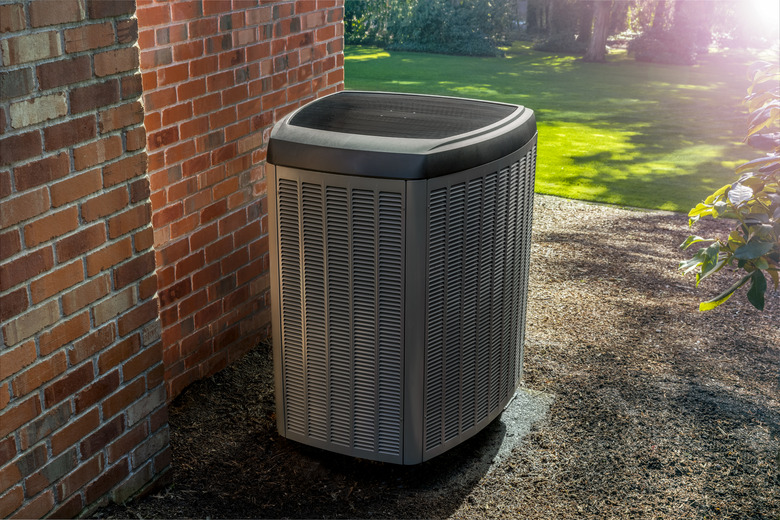What Size Heat Pump Should I Use For An 1,800-Square-Foot Home?
We may receive a commission on purchases made from links.
Sizing a heat pump or any heating and cooling system isn't a simple task. Doing so by just using square footage is a quick guess at best and shouldn't be used to achieve efficient system sizing. A system that's too big won't remove the humidity while the heat pump is trying to cool the home, and one that's too small won't heat or cool the home efficiently. Using online system calculators is a quick, effective means of estimating the size of the heat pump required for an 1,800-square-foot home. Many may argue that due to the newer energy efficient modulating (multispeed) systems, bigger isn't so bad, but even those have to at least be in the correct range for humidity control, efficiency, and initial cost.
Tip
An 1,800-square-foot home will need a 3-ton system in northern climates and a 4.5-ton system in southern climates. This is based on standard home insulation, ceiling height, and thermal efficiency of windows and doors. These figures are rough estimates, and calculations may vary.
Estimating Size With Online Calculators
Estimating Size With Online Calculators
Putting the information together is tedious but fairly easy if you know your home. Go around room by room and take note of the square footage of each and the orientation and count of each window and door. Don't forget about the ceiling height.
After gathering the information for each room, input it into an online HVAC load calculator. These calculators are a quick, easy way to get an idea of what size system may be needed for your application. Be sure to use more than one calculator and average the results based on that information. They are not all the same and results may vary.
Using a few different online calculators for an 1,800-square-foot home, you'll find system sizes to be from 3 tons or 36,000 Btu to 4.5 tons or 54,000 Btu based on region and cooling load results. Either way, it's always a good idea not to oversize or undersize your heat pump for optimal humidity control, efficiency, and performance.
The Standards Explained
The Standards Explained
Many local building officials want you or your HVAC contractor to have an accurate heat load calculation done, many times by a third party. The most accepted way to size a system according to the Air Conditioning Contractors Association of America (ASHRAE) is to do a load calculation that considers building construction, orientation, "R" value of the insulation, the number of rooms, and placement and thermal efficiency of windows and doors. ASHRAE recommends the use of industry protocols Manual-J and Manual-S to size a system, as these take all this information into account.
Included in the calculations are the number of levels that a house has, the climate in which the house is located, the number of occupants living in the home, and sometimes the appliances. All of these things are input into a formula to determine the most energy-efficient heat pump for the application while maintaining the proper humidity level. Heat pumps are typically sized to the cooling load (rather than the heating load) to obtain the best humidity control.
System Efficiency and Type
System Efficiency and Type
The efficiency and system type factor into the size as well. Some newer high-efficiency heat pumps known as SEER (Seasonal Energy Efficiency Rating) give off more heat than cooling all based on the climate where the outdoor unit is installed. Even these have a heating and cooling range within which they modulate (ramp up or down based on demand).
These figures may be based on whether the system is ducted or not. A ducted system won't be as efficient as a nonducted system. Standard or minimum efficiency systems have one speed, and the output or Btu of the equipment is a fixed figure.
Heat Load Services
Heat Load Services
Most HVAC contractors either pay for the software necessary or hire out the job to those whose entire business consists of heat load calculations and duct sizing. Either way, the tedious work of gathering accurate information for your specific home isn't wasted. With proper sizing, you can have peace of mind knowing that your system is sized for your home.
References
- Energy Star: Air Source Heat Pumps
- ASHRAE: Buyers Beware: Correctly Sized Air Conditioners Save Money!
- Heat Pumps Guide: Heating & Cooling Tips: Why Proper Heat Pump Sizing Is Important – Basic Guide
- PickHvac Cooling & Heating Guide: What Size Heat Pump Do I Need (Heat Pump Size Calculator)
- Mitsubishi Electric: M Series Submittal Data: MSZ-FH18NA2 & MUZ-FH18NAH2 18,000 BTU/H Wall-Mounted Heat Pump System
